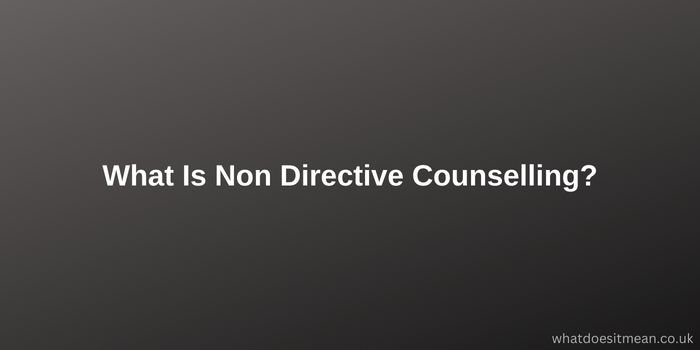
What Is Non Directive Counselling?
Non-directive counselling is a form of psychotherapy that is focused on the individual and not on the counselor. In this type of counseling, the counselor is not concerned with the problem, but focuses on the person and their unique emotional and intellectual characteristics. They often use persuasive methods to reach the client’s goals and to deal with immediate problems. While directive counselling focuses on a particular problem, non-directive therapy aims to identify a person’s specific needs and problems and work towards a solution.
The most common forms of non-directive counselling are a mix of the two approaches.
Therapists using these methods will approach issues differently. A counsellor who uses an eclectic approach is free to use any technique that they feel will be most beneficial for their client. In addition, eclectic counsellors will use as many techniques as they feel are appropriate. While these methods have their advantages, they are not as helpful for everyone. They are not appropriate for everyone and may not be right for your problem.
Non-directive approaches are most often used by psychologists, therapists, and psychiatrists. However, they can also be used by teachers and counselors. The idea behind non-directive therapy is to give an individual a voice and to resolve difficulties through open and honest dialogue. In non-directive counselling, the counsellor will help the client identify and explore his or her personal strengths and weaknesses, and will encourage the individual to take the first steps in solving their problems.
The goal of non-directive therapy is to help clients work through problems in a positive manner. By discussing personal issues and exploring potential solutions, these types of therapy can improve a person’s confidence and self-awareness. These types of counselling have many advantages, and it can help those who are experiencing problems to overcome the challenges they face. So, if you are seeking help for a difficult problem, non-directive counselling may be the right approach for you.
Another way to get help is to seek a counsellor’s opinion and guidance.
It can be helpful to seek advice from a friend, relative, or colleague. This can lead to more effective and efficient counselling. The counselor will guide the client to choose a good counsellor and will keep the relationship positive. The counselor will be able to make sure the counselee understands their problems and feels safe. The goal is to build trust and confidence in the counsellor, which can help the client make positive choices.
In addition to non-directive counselling, non-directive therapy can be used in other types of psychotherapy. In addition to psychologists and psychiatrists, teachers and certified counselors can also use non-directive methods. These methods are known to be more effective and can help individuals work through a variety of problems. You can also choose a counselor based on your preference. You can choose a counsellor based on what works best for you.
Non-directive counselling is a type of psychotherapy that is most often used by psychologists and psychiatrists. It is a form of therapy that is based on the client’s needs and interests and focuses on helping them develop strategies. By using a non-directive approach, the counselor can help the client solve problems on their own. It can be used in both direct and non-directive therapy sessions. The counselor will also be a great resource for a client.
Non-directive therapy uses a variety of techniques and methods. The counselor is not the focus of the therapy, but rather is a facilitator of the client’s process. In a non-directive session, the counsellor will not prescribe a solution for the client. Instead, they will help the client to develop a strategy for solving their problem on their own. An effective counselor will empower their clients by listening to their needs and helping them to develop strategies for self-help.
Non-directive counselling is a type of psychotherapy that is different from conventional therapy. Although both forms of therapy are beneficial, non-directive therapy is usually used in cases where an individual is experiencing emotional turmoil and is not ready to talk about their problem directly with a counsellor. It helps people to discuss and work out problems in a relaxed and comfortable environment, while allowing them to remain independent. It is important to note that both types of counselling require a balance between the two types.

